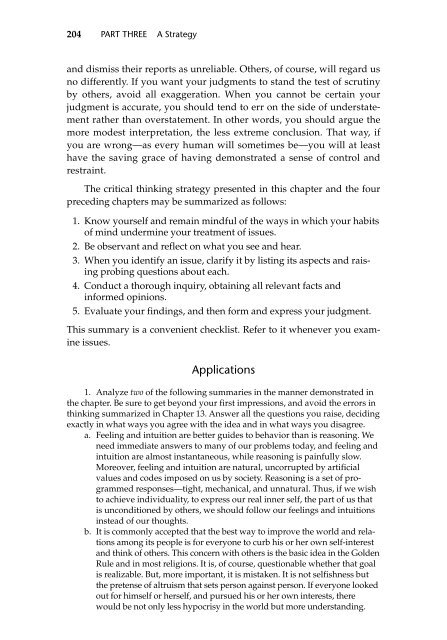Beyond Feelings
Beyond Feelings
Beyond Feelings
Create successful ePaper yourself
Turn your PDF publications into a flip-book with our unique Google optimized e-Paper software.
204 PART THREE A Strategy<br />
and dismiss their reports as unreliable. Others, of course, will regard us<br />
no differently. If you want your judgments to stand the test of scrutiny<br />
by others, avoid all exaggeration. When you cannot be certain your<br />
judgment is accurate, you should tend to err on the side of understatement<br />
rather than overstatement. In other words, you should argue the<br />
more modest interpretation, the less extreme conclusion. That way, if<br />
you are wrong—as every human will sometimes be—you will at least<br />
have the saving grace of having demonstrated a sense of control and<br />
restraint.<br />
The critical thinking strategy presented in this chapter and the four<br />
preceding chapters may be summarized as follows:<br />
1. Know yourself and remain mindful of the ways in which your habits<br />
of mind undermine your treatment of issues.<br />
2. Be observant and reflect on what you see and hear.<br />
3. When you identify an issue, clarify it by listing its aspects and raising<br />
probing questions about each.<br />
4. Conduct a thorough inquiry, obtaining all relevant facts and<br />
informed opinions.<br />
5. Evaluate your findings, and then form and express your judgment.<br />
This summary is a convenient checklist. Refer to it whenever you examine<br />
issues.<br />
Applications<br />
1. Analyze two of the following summaries in the manner demonstrated in<br />
the chapter. Be sure to get beyond your first impressions, and avoid the errors in<br />
thinking summarized in Chapter 13. Answer all the questions you raise, deciding<br />
exactly in what ways you agree with the idea and in what ways you disagree.<br />
a. Feeling and intuition are better guides to behavior than is reasoning. We<br />
need immediate answers to many of our problems today, and feeling and<br />
intuition are almost instantaneous, while reasoning is painfully slow.<br />
Moreover, feeling and intuition are natural, uncorrupted by artificial<br />
values and codes imposed on us by society. Reasoning is a set of programmed<br />
responses—tight, mechanical, and unnatural. Thus, if we wish<br />
to achieve individuality, to express our real inner self, the part of us that<br />
is unconditioned by others, we should follow our feelings and intuitions<br />
instead of our thoughts.<br />
b. It is commonly accepted that the best way to improve the world and relations<br />
among its people is for everyone to curb his or her own self-interest<br />
and think of others. This concern with others is the basic idea in the Golden<br />
Rule and in most religions. It is, of course, questionable whether that goal<br />
is realizable. But, more important, it is mistaken. It is not selfishness but<br />
the pretense of altruism that sets person against person. If everyone looked<br />
out for himself or herself, and pursued his or her own interests, there<br />
would be not only less hypocrisy in the world but more understanding.


